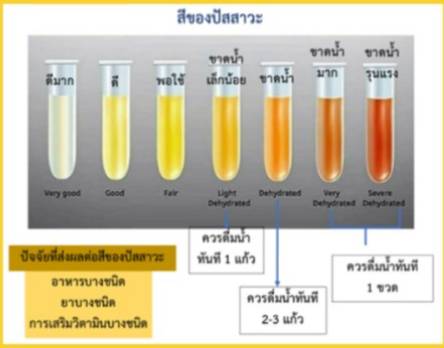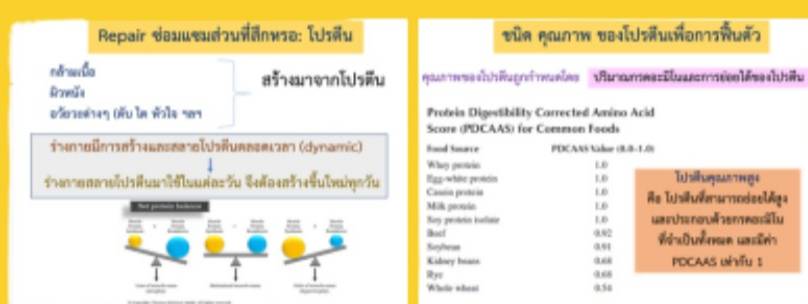
โภชนาการเพื่อการฟื้นฟูสมรรถภาพทางการกีฬาสำหรับนักกีฬามวยไทย
กีฬามวยไทยจัดอยู่ในกีฬาต่อสู้ มีการปะทะกัน ซึ่งต้องต่อสู้แบบตัวต่อตัวเพื่อทำคะแนน ให้คู่ต่อสู้ยอมแพ้หรือทำให้คู่ต่อสู้หมดสภาพในการแข่งขัน เป็นกีฬาที่เสี่ยงต่อการบาดเจ็บแนวทางโภชนาการที่อิงตามหลักฐานสามารถลดความเสียงของการบาดเจ็บ และช่วยฟื้นฟูร่างกายให้กลับมาเล่นกีฬาได้อย่างปลอดภัยการฟื้นฟูหลังการออกกำลังกาย หมายถึง การฟื้นฟูความสามารถในการฝึกช้อม หลังการฝึกข้อมหรือการแข่งขันจะมีการสะสมความเหนื่อยล้าและการลดลงของประสิทธิภาพในการกีฬาในชั่วโมงและวันหลังการฝึกซ้อม ร่างกายจะฟื้นตัวและคาดว่าประสิทธิภาพจะกลับคืนสู่สภาพปกติหรือดีขึ้น
แนวทาง 4R ในการเพิ่มประสิทธิภาพการฟื้นตัวหลังการออกกำลังกาย
1.การชดเชยน้ำ (Rehydration) เป็นกระบวนการพื้นฐานที่ขึ้นอยู่กับนักกีฬา สภาพแวดล้อม และการแข่งขันกีฬา
2.การเดิมพลัง (Refuel) - การบริโภคคาร์โบโฮเดรต เพื่อเติมและชดเชย ไกลโคเจน และช่วยตอบสนองความต้องการพลังงานสำหรับระบระบบภูมิคุ้มกัน
และการซ่อมแซมเนื้อเยื่อ
3.การซ่อมแชม (Repair) -การบริโภคโปรตีนคุณภาพสูงและครีอะตินโมโน ไฮเดรตหลังการออกกำลังกายช่วยให้การเจริญเติบโตและการซ่อมแซมเนื้อเยื่อเป็นไปได้ดีขึ้น
4.การพักผ่อน (Rest)-การรับประทานอาหารก่อนอนมีผลฟื้นฟูฟื้นฟูที่ช่วย ให้การฟื้นตัวของระบบกล้ามเนื้อและกระดูก ระบบต่อมไร้ท่อ ระบบประสาท
1.การชดเชยน้ำ (Rehydration) เป็นกระบวนการพื้นฐานที่ขึ้นอยู่กับนักกีฬา สภาพแวดล้อม และการแข่งขันกีฬา การเติมน้ำให้ร่างกายเพื่อให้ร่างกายได้รับน้ำอย่างน้อย150% ของน้ำหนักที่สูญเสียไประหว่างการออกกำลังกาย (~1.5 ลิตร) ร่วมกับโซเดียม (หากจำเป็นต้องเติมโซเดียมทดแทน)
2.การเติมพลัง ( Refuel) โดยการบริโภคคาร์โบไฮเดรตเพื่อเติมและชดเชยไกลโคเจนและช่วยตอบสนองความ
ต้องการพลังงานสำหรับระบบภูมิคุ้มกันและการซ่อมแซมเนื้อเยื่อ
3. การซ่อมแซม ( Repair)
การบริโภคโปรตีนคุณภาพสูงหลังการออกกำลังกายช่วยให้การเจริญ เติบโตและการซ่อมแซมเนื้อเยื่อเป็นไปได้ดีขึ้น
- แนะนำการบริโภคโปรตีนคณภาพสูง 0.5 กรัมต่อน้ำหนักตัว 1 กิโลกรัม หรือปริมาณโปรตีน 40 กรัม
- โปรตีนต่อมื้อควรอยู่ระหว่าง 0.25 ถึง 0.40 กรัมต่อน้ำหนักตัว 1 กิโลกรัม หรือเท่ากับ 20 กรัม
4. การพักผ่อน (Rest)
การนอนเป็นกระบวนการฟื้นฟูทางด้านสรีระของร่างกายและด้านความคิดการตัดสินใจจากกิจกรรมการฝึกช้อมหรือการแข่งขันกีฬาที่ทำให้เกิดความเมื่อยล้าและเป็นการเตรียมความพร้อมต่อการแข่งชันหรือฝึกข้อมกีฬาในครั้งต่อไป การนอนยังช่วยฟื้นฟูหรือพัฒนาระบบภูมิคุ้มกันและระบบต่อมไร้ท่อของร่างกายให้ทำงางานอย่างมีประสิทธิภาพฟื้นฟูและปรับสภาพการทำงานของระบบประสาทและละระบบพลังงานของร่างกาย นอกจากนี้ยังช่วยพัฒนาในเรื่องของความจำและทักษะการเรียนรู้ และเป็นปัจจัยในการป้องกันภาวะการฝึกมากเกิน (overtraining)อีกด้วย ถ้านักกีฬาอดนอน หรือมีการนอนหลับพักผ่อนไม่เพียงพอไปสู่สมรรถภาพทางกายที่ลดลง (ความแข็งแรง, พลังกล้ามเนื้อ, เวลาปฏิกิริยา, ความเร็วอดทน และความแม่นยำ) เกิดการลดลงทางสภาวะอารมณ์ แรงจูงใจและแรงกระตุ้นทางร่างกายลดลง มีความเสี่ยงต่อความเจ็บป่วยและอาการบาดเจ็บ การควบคุมน้ำหนัก และ ความสามารถในการทนต่อความเจ็บปวด
คำแนะนำการบริโภคคาร์โบไฮเดรต
- การฝึกซ้อมระยะเวลาปานกลาง/ความเข้มข้นต่ำ (เช่น ฝึกซ้อมอย่างเข้มข้น 2-3 ชั่วโมงต่อวัน 5-6 ครั้งต่อสัปดาห์) แนะนำให้บริโภค 5-8 กรัมต่อน้ำหนักตัว 1 กิโลกรัมต่อวัน
- การฝึกความอดทนระดับปานกลางถึงหนัก (เช่น 3-6 ชั่วโมงต่อวันของการฝึกที่เข้มข้นโดยแบ่งเป็น 1-2 ครั้งต่อวันเป็นเวลา 5-6 วันต่อสัปดาห์) แนะนำให้บริโภค 8-10 กรัมต่อน้ำหนัก 1 กิโลกรัมต่อวัน
- โปรแกรมการฝึกที่รุนแรงหรือการแข่งขัน (+6 ชั่วโมงต่อวันหรือความถี่ในการแข่งขันสูงตลอดสัปดาห์):แนะนำให้บริโภค 8-10 กรัมต่อน้ำหนัก 1 กิโลกรัมต่อวัน
เจ้าของผลงาน “ผู้ช่วยศาสตราจารย์ ดร.สุรัสวดี สมนึก คณะวิทยาศาสตร์การกีฬาและสุขภาพ มหาวิทยาลัยเกษตรศาสตร์ วิทยาเขตกำแพงแสน”



Nutrition for Sports Performance Recovery in Muay Thai Athletes
Muay Thai as a Combat Sport and Nutrition-Based Recovery Strategies
Muay Thai is classified as a combat sport that involves intense physical engagement, requiring athletes to compete in one-on-one battles to score points, force an opponent into submission, or render them unable to continue. Due to the high-impact nature of the sport, fighters face a significant risk of injury.
Evidence-based nutritional strategies can play a crucial role in injury prevention and post-training recovery, ensuring that athletes can safely return to training and competition.
Post-exercise recovery refers to the process of restoring an athlete’s training capacity after rigorous practice or competition. Following intense exertion, fatigue accumulates, leading to temporary declines in athletic performance. Within the hours and days after training, the body undergoes a natural recovery process, allowing performance levels to return to baseline or even improve through proper nutrition and recovery protocols.
The 4R Approach to Enhancing Post-Exercise Recovery
1. Rehydration – The process of restoring fluid balance, which depends on the athlete’s individual needs, environmental conditions, and the intensity of competition.
2. Refuel – The consumption of carbohydrates to replenish glycogen stores, support energy demands, and aid in immune function and tissue repair.
3. Repair – The intake of high-quality protein and creatine monohydrate post-exercise promotes muscle growth and tissue recovery, enhancing overall physical resilience.
4. Rest – Proper pre-sleep nutrition plays a critical role in muscle and bone recovery, as well as supporting endocrine and nervous system function, facilitating optimal athletic performance restoration.
1. Rehydration
Rehydration is a fundamental physiological process influenced by the athlete’s individual condition, environmental factors, and the intensity of competition. To restore optimal hydration levels, athletes should consume at least 150% of the fluid lost during exercise (~1.5 liters), along with sodium supplementation if necessary to replenish electrolyte balance.
2. Refuel
Refueling involves the consumption of carbohydrates to replenish glycogen stores and meet the energy demands required for immune function and tissue repair. This process is essential for accelerating recovery and maintaining peak athletic performance.
3. Repair
Consuming high-quality protein post-exercise is essential for muscle growth and tissue repair. Proper protein intake enhances recovery efficiency and supports muscle adaptation to training stress.
• Recommended protein intake: 0.5 grams per kilogram of body weight, or approximately 40 grams of protein per session.
• Per-meal protein distribution: 0.25 to 0.40 grams per kilogram of body weight, or about 20 grams per meal, to optimize muscle protein synthesis.
4. Rest
Sleep is a critical physiological and cognitive recovery process that allows athletes to recover from fatigue, optimize decision-making, and prepare for future training or competition. Adequate sleep also supports immune system function, regulates endocrine processes, and restores neuromuscular and energy system balance.
Furthermore, sleep enhances memory consolidation, skill acquisition, and learning ability while serving as a key factor in preventing overtraining syndrome.
Insufficient sleep or poor sleep quality can lead to:
• Declines in physical performance, including strength, muscular power, reaction time, endurance, and accuracy.
• Negative psychological effects, such as reduced motivation, lower energy levels, and mood disturbances.
• Increased risk of illness and injury, impaired weight management, and a reduced pain tolerance threshold.
Ensuring proper rest and recovery is fundamental for sustaining peak athletic performance in Muay Thai and other high-intensity combat sports.
Muay Thai Athletes
• Moderate-duration/low-intensity training (e.g., 2–3 hours of intense training per day, 5–6 times per week):
Recommended intake: 5–8 grams of carbohydrates per kilogram of body weight per day.
• Moderate-to-high endurance training (e.g., 3–6 hours of intense training per day, split into 1–2 sessions, 5–6 days per week):
Recommended intake: 8–10 grams of carbohydrates per kilogram of body weight per day.
• High-intensity training or competition phases (e.g., more than 6 hours of training per day or frequent competitions throughout the week):
Recommended intake: 8–10 grams of carbohydrates per kilogram of body weight per day.
Proper carbohydrate consumption is essential for glycogen replenishment, sustained energy production, and optimal performance in Muay Thai and other high-intensity combat sports.
Author: Assistant Professor Dr. Suraswadi Somnuek Faculty of Sports Science and Health, Kasetsart University, Kamphaeng Saen Campus
